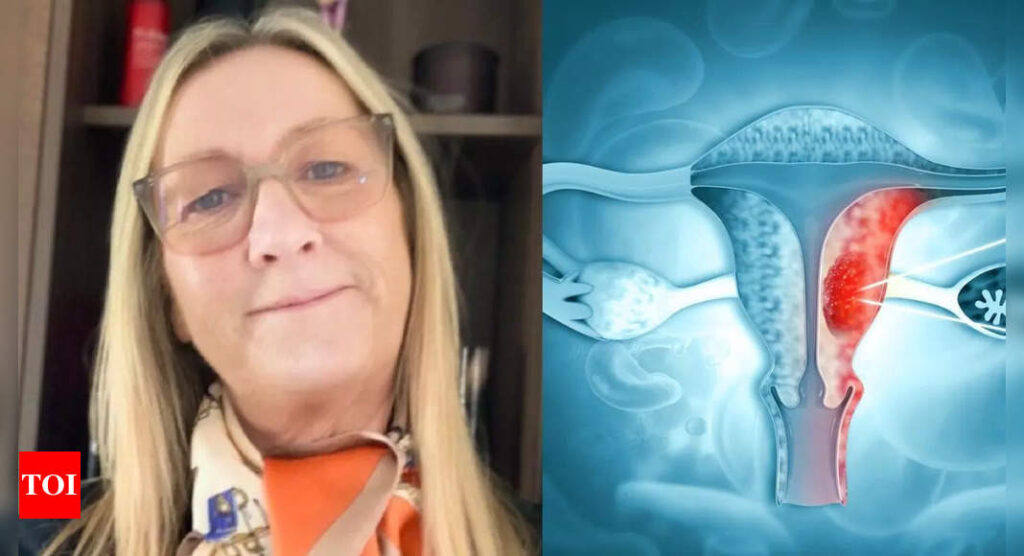Menopause is a complex and transformative period in a woman’s life, marked by many changes in the body and mind. It is the time when the menstrual periods stop permanently and due to the changes in hormones, a range of uncomfortable symptoms like hot flashes, night sweats, vaginal dryness, and mood swings, is experienced.
A 58-year-old woman mistakenly thought her womb cancer symptoms are due to menopause and kept ignoring them until her stomach became noticeably swollen. On advice of her family members, she went to a doctor, and found out she had advanced-stage womb cancer.
Cancerous changes in the lining of the womb typically take place in a woman’s late 40s and cancer of the endometrium is most commonly diagnosed in women in their 50s and 60s, according to National University Cancer Institute Singapore.
The symptom she ignored
Dawn Willis was suffering from vaginal bleeding for about a year, but she dismissed it as a symptom of the menopause.
However, when her stomach became swollen, she got herself checked, and was horrified to know that she had advanced-stage womb cancer.
Thankfully, she became cancer-free after battling her condition bravely and now wants to spread awareness around her condition hoping to save someone’s life.
Is postmenopausal bleeding always a sign of cancer?
Postmenopausal bleeding is not usually serious, but can be a sign of cancer.
Postmenopausal bleeding can occur due to various underlying conditions, ranging from benign to serious. Common causes include vaginal atrophy, where the vaginal lining becomes thin and dry, making it prone to bleeding, and hormone replacement therapy (HRT), as changes or discontinuation can trigger spotting. Uterine polyps, which are noncancerous growths, and endometrial hyperplasia, a condition where the uterine lining thickens and may contain abnormal cells, are also frequent culprits.
More serious causes include uterine cancer, with approximately 90% of cases presenting with vaginal bleeding, and cervical cancer. In some cases, inflammation of the cervix (cervicitis), bleeding from nearby organs like the bladder or rectum, or vaginal trauma can also lead to postmenopausal bleeding. Any unexpected bleeding after menopause should be evaluated by a healthcare professional to determine the cause and appropriate treatment.
Symptoms of uterine cancer

They include bleeding or spotting from the vagina after menopause, heavy periods that are unusual, vaginal bleeding between periods, and a change to vaginal discharge.
“I was so angry with myself when I got the diagnosis as I had ignored the symptoms,” Willis said.
“So much happens to your body during the menopause that I thought the bleeding was normal. But then my belly became swollen and my family told me to get checked out.
“I’m really glad they did because I was diagnosed with advanced womb cancer. If I had waited even just a couple more months, I don’t think I’d be here today.
“I’m always the first one to advise people to see a doctor so I don’t know why I left it for so long. I was just so angry at myself for ignoring these signs.”
However, after she got over the initial shock of diagnosis, Dawn focused on getting better, when she realized her cancer wasn’t terminal.
“When they told me that it wasn’t terminal, I thought, ‘Right, I’m going to beat this.’ I love my life. I love my husband Mark, who I have been with since we were 16,” she said.
Willis’ initial cancer diagnosis came in March 2017, and after undergoing treatment for a year, she underwent remission in March 2018 and was declared cancer-free in March 2022.
Willis lives with a perforated bowel following her treatment but still living life with jest.
“I’m fine with my stoma as it saved my life, but I likely wouldn’t need that if I had got checked sooner,” she said. “So I just really want to spread that message. If something isn’t right, don’t leave it!
“Even if you feel fine. I only had that symptom and otherwise felt healthy. So visit your GP and get yourself checked out.
“If someone can see what I’m saying and think, ‘I’ve got that, I’ll get checked’… If I could save one person’s life, that’s what this is for.”
(Picture courtesy: Instagram/East Kent Hospitals, iStock)


